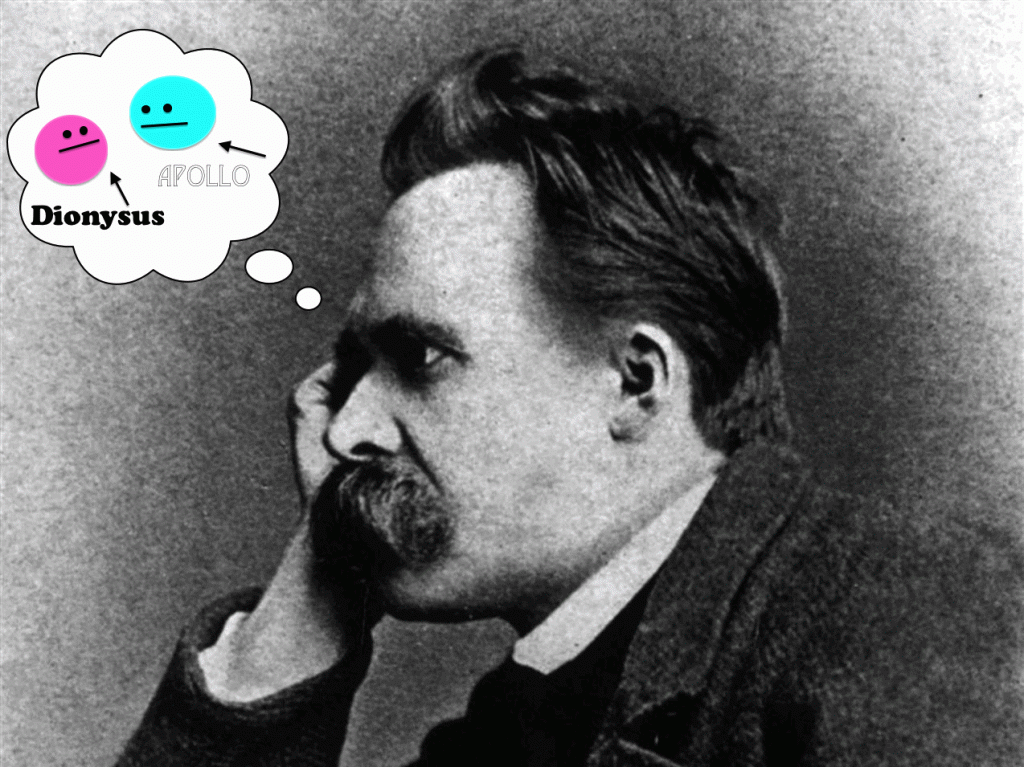
I ain’t no philosopher.
But I like reading about the nature of existence and being, as long as the concepts are simplified for me by someone other than the philosopher him/herself. (Sorry, Kant, but I can’t.) Several years ago I caught an existential crisis which I have yet to kick. It’s like having chronic hiccups, except that we’re all gonna die. So I read philosophy stuff sometimes to try and sort all of this out.
Like so many before me (and countless souls to come), I found Nietzsche awhile back, my own private Nietzsche, a Nietzsche that ceased being a quip-machine or a bumper sticker punchline and became something like a friend from beyond the grave. It’s so odd to me now that the prevailing concept of Nietzsche (and I held this view once) is that of a dark, brooding fellow with a large mustachioed lip and a death obsession. The large mustache is correct, and he did brood about death, but only insofar as it was the end of life and life was his main concern.
Nietzsche could hardly be described as happy-go-lucky, but he was all about life-affirmation, in fact. This was a guy who said, “Without music, life would be a mistake” and whose concept of a person profoundly in love with life despite the constant suffering and struggle that attends it (the “overman” or Ubermensch) was arguably the tenderloin of his life’s work. It’s critical to note also that Nietzsche would’ve been horrified at how Hitler twisted his philosophy on the overman to suit his wicked Nazi ideology. Nietzsche spoke fearlessly of freedom and truth; he railed against racism, destruction, and dogma. He couldn’t stand politicians — he couldn’t even stand his home country (Germany) so anything you heard about Nietzsche being a Nazi, you can put that to bed.
Something terribly sad happened to Nietzsche in 1889. He was in Turin and not doing very well, suffering from nerves and dyspepsia and all those maladies that seemed to strike everyone in the late 1800s, usually in a parlor. Out his window, presumably while reclining on a fainting couch, Nietzsche saw a coachman on the street brutally beating an old mare. Overcome with grief at the sight, horrified at the cruelty he was seeing, Nietzsche ran out to the street and threw his body in front of the coachman. He gripped the horse around the neck and sobbed in the street at the inhumanity of it all.
After that, he wasn’t the same guy. He lived twelve more years, but he wasn’t well. Some say he had had syphilis for many years and that’s what melted his brain, in the end. Some say he was just fooling people about being nuts, that he was just eccentric and that was that. He died of pneumonia in 1900. And, because the truth is that the man really was a quip-machine, a few juicy aphorisms* from our pal Fred:
“Whatever is done from love always occurs beyond good and evil.”
“A man’s maturity consists in having found again the seriousness one had as a child, at play.”
“Talking much about oneself can also be a means to conceal oneself.”
“Half-knowledge is more victorious than whole knowledge: it understands things as being more simple than they are and this renders its opinions more easily intelligible and more convincing.”
*Aphorism: a pithy observation that contains a general truth, such as, “if it ain’t broke, don’t fix it.”

Vicki Holloway
those defining moments in life are pretting amazing, scary and totally change the journey, don’t they? Enjoy this glorious day and if you are like me I am going to sew like mad once the sun goes down and process my day. Have a great one. V